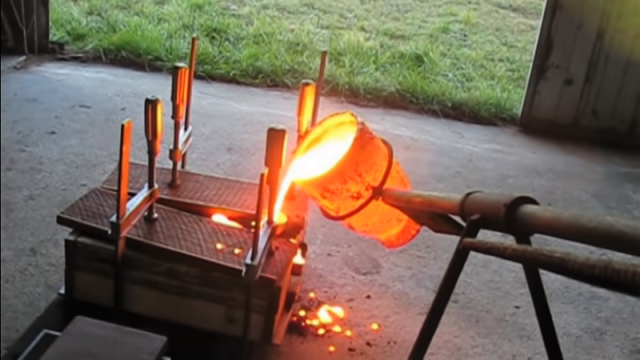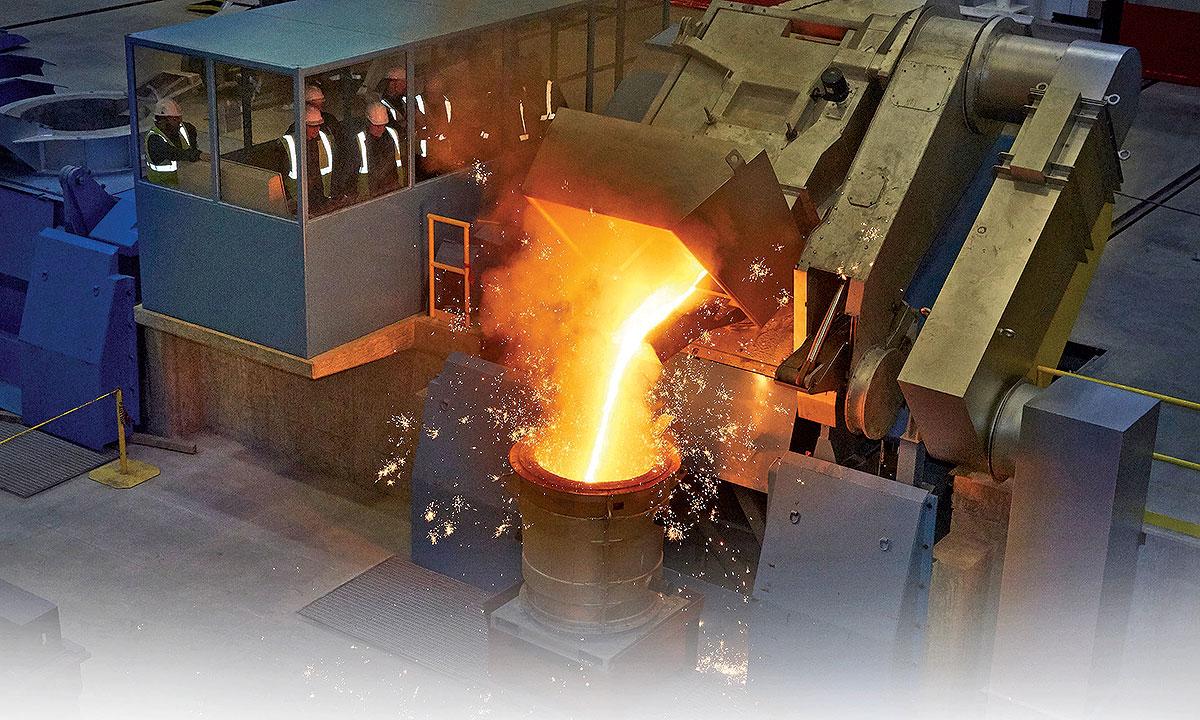A Comprehensive Overview to Metal Casting: Benefits and Services Offered by Foundries
Metal casting is a crucial procedure in different sectors, using various advantages with the services of factories. These centers transform liquified metal into exact and resilient parts, satisfying specific customer requirements. By utilizing advanced modern technologies, foundries guarantee high quality and performance in production. The ins and outs of metal casting and the varied techniques included increase vital questions regarding its role in modern production. What technologies lie ahead in this essential area?
Understanding the Metal Casting Process
The metal casting procedure is an essential strategy utilized in manufacturing to create complex shapes and components. This method entails putting liquified metal right into a mold and mildew made to create the wanted things. The procedure begins with pattern development, which works as a theme for the mold and mildew. Metal Casting. Different materials, such as sand, metal, or ceramic, are utilized for mold-making, depending on the certain needs of the casting
When the mold is ready, liquified metal is poured into it and allowed to solidify and cool. After solidification, the mold is eliminated, exposing the cast component. Numerous strategies, including sand casting, investment casting, and pass away casting, are utilized, each suited to various applications and materials. Quality control actions, such as examinations and testing, are important to assure the last product satisfies specifications. Overall, the metal casting procedure plays an essential role in producing parts for industries varying from vehicle to aerospace.
Key Conveniences of Metal Casting
Metal casting uses significant benefits that make it a preferred production technique in various sectors. Its style flexibility and accuracy permit for detailed forms, while economical automation improves efficiency. In addition, the flexibility and toughness of materials made use of in casting add to the toughness of the final items.
Layout Versatility and Accuracy
Releasing exceptional layout versatility and accuracy, metal casting permits designers and engineers to develop intricate shapes and attributes that would be difficult or difficult to achieve with various other making techniques. This ability makes it possible for the manufacturing of complex geometries, internal frameworks, and fine details that improve product performance and looks. In addition, various casting techniques, such as sand casting, investment casting, and die casting, supply more alternatives for customization, fitting diverse material homes and job demands. The versatility of molds permits modifications during the design phase, improving the change from idea to final product. Eventually, metal casting sticks out for its capability to provide high-precision components, making it a vital procedure in markets varying from auto to aerospace and past.
Economical Mass Manufacturing
Economical automation stands as one of the main benefits of metal casting, allowing producers to generate big quantities of components at a lower cost each. This efficiency emerges from the capacity to produce detailed mold and mildews that can be recycled several times, considerably reducing setup and functional expenses. Additionally, metal casting procedures, such as sand casting and pass away casting, permit high throughput, making it practical to satisfy the demands of large manufacturing runs. The decreased product waste and energy intake additionally enhance cost financial savings, making metal casting an appealing option for sectors needing mass components. On the whole, the economical nature of metal casting positions it as a recommended method for manufacturers going for economic performance in their production processes.
Material Flexibility and Stamina
One of the standout features of metal casting is its amazing product flexibility, which allows for the usage of a vast array of metals and alloys. This adaptability allows manufacturers to choose products that ideal suit their particular applications, from light weight aluminum and bronze to iron and steel. Each metal offers special residential properties, including varying degrees of toughness, corrosion resistance, and thermal conductivity. Consequently, metal casting can generate parts that satisfy rigid performance requirements throughout varied sectors, such as automobile, aerospace, and building and construction. Furthermore, the stamina of actors steels can be boosted via various treatment processes, guaranteeing sturdiness and durability. Aluminum Foundry. On the whole, the mix of product convenience and integral strength makes metal casting a preferred option for creating high-grade parts
Sorts Of Metal Casting Strategies
Metal casting incorporates a range of methods that deal with different manufacturing needs and material residential properties. Typical techniques include sand casting, which uses a sand mold for complex shapes, and financial investment casting, recognized for its precision and surface coating. Pass away casting is an additional method that utilizes high-pressure injection of molten metal into mold and mildews, suitable for automation of little parts.
Shell molding provides a faster alternative, utilizing a resin-coated sand to create thin-walled mold and mildews, while lost foam casting enables detailed styles without the need for a core.
In addition, constant casting is utilized for generating lengthy areas of metal, such as sheets or bars, by solidifying molten metal in a continual process. Each strategy is and provides distinct benefits selected based upon elements like the called for detail, production volume, and material kind, ensuring superior results in metal manufacture across different markets.
The Duty of Foundries in Metal Casting
Shops play a crucial role in the metal casting procedure, working as the facilities where molten metal is changed into completed items. These specialized establishments are outfitted with the required devices and technologies to deal with numerous metals, making certain high-grade outcomes. Factories are accountable for several important features, including melting the metal, putting it right into molds, and allowing it to strengthen.
Additionally, they preserve stringent safety and ecological requirements to secure employees and minimize ecological effect. Experienced technicians and engineers work together to enhance casting procedures, enhancing performance and decreasing waste. Factories likewise participate in top quality control measures, guaranteeing that the final products satisfy particular tolerances and specs. This quality control is necessary for industries that count on exact parts, such as auto and aerospace. Because of this, factories add substantially to the general production landscape, making it possible for technology and development throughout different industries.
Customized Metal Casting Services
Personalized metal casting solutions supply customized layout solutions that meet specific client requirements. These solutions additionally give product option expertise, ensuring the right metal is selected for the desired application. Such adaptability and expertise improve the overall top quality and performance of the final item.

Tailored Layout Solutions
Tailored style solutions in metal casting supply manufacturers with the adaptability to create elements that satisfy details efficiency and visual requirements. Factories use tailored services that allow clients to specify measurements, shapes, and surface coatings to accomplish wanted end results. This customization process typically consists of cooperation in between engineers and developers, making certain that the last products straighten with functional needs and sector requirements. Advanced modern technologies, such as computer-aided layout (CAD) and simulation software program, make it possible for precise modeling and testing of components before production, enhancing and minimizing mistakes performance. By leveraging customized layout options, organizations can try here enhance performance while minimizing waste and costs, eventually leading to a much more one-upmanship in the market. This flexibility is necessary for industries calling for distinct applications and specs.
Product Choice Expertise
When picking products for metal casting, competence plays an important role in guaranteeing that the right selection lines up with both efficiency needs and cost-effectiveness. Shops use knowledgeable specialists that understand the properties of various steels and alloys, enabling them to suggest perfect products for specific applications. Variables such as stamina, deterioration resistance, and thermal conductivity are very carefully considered to satisfy the customer's requirements. Additionally, market fads and improvements in material scientific research notify these decisions, making it possible for factories to stay affordable. By leveraging their competence, foundries can help customers in steering with facility material choices, ultimately causing boosted product top quality and minimized manufacturing costs. This specific expertise is vital for attaining successful end results in customized metal casting solutions.
High Quality Control in Metal Casting
Quality control in metal casting is critical to assure that the end products satisfy the called for specifications and efficiency standards. Factories utilize a selection of methodologies and techniques to assure the finest quality of actors parts. This procedure starts with stringent material evaluations, confirming that resources abide by sector standards. Throughout the casting process, real-time surveillance and screening are conducted to examine criteria such as temperature level, mold stability, and dimensional precision.

Applications of Metal Castings Across Industries
Metal spreadings play an important duty in various markets, working as the foundation for numerous applications. In the vehicle field, cast components such as engine blocks and transmission housings are needed for automobile efficiency and reliability. The aerospace industry relies upon accuracy spreadings for vital components that guarantee security and performance in trip. Additionally, the building and construction sector uses metal castings for fixtures, fittings, and structural aspects, boosting the resilience of buildings and facilities.
In addition, the power field gain from spreadings used in turbine blades and other equipment important for power generation - Metal Foundry. The clinical field also utilizes metal spreadings in instruments and devices, demonstrating the convenience of this production procedure. Overall, metal castings are indispensable to the performance and improvement of diverse sectors, showcasing their importance in modern-day innovation and facilities development
Frequently Asked Inquiries
What Products Are Frequently Utilized in Metal Casting?
Common products utilized in metal casting include light weight aluminum, iron, steel, bronze, and brass. Each product provides unique residential or commercial properties ideal for different applications, permitting manufacturers to select the most effective option based upon deterioration, strength, and weight resistance.
Exactly how Lengthy Does the Metal Casting Process Typically Take?
The metal casting procedure typically takes numerous hours to a few days, depending on factors such as the intricacy of the style, kind of metal used, and the specific you could try this out casting approach utilized by the foundry.
What Is the Ecological Effect of Metal Casting?
The environmental influence of metal casting includes power usage, emissions, and waste generation. Shops commonly execute steps to minimize these impacts, such as reusing products and utilizing cleaner modern technologies to minimize their environmental footprint.
Can Metal Casting Be Provided For Small-Scale Projects?
Metal casting can undoubtedly be performed for small jobs. Numerous foundries provide to such requirements, supplying customized remedies that fit restricted manufacturing runs while preserving high quality and accuracy in the end products.
What Are the Safety And Security Measures in Metal Casting Foundries?
In metal casting shops, safety and security actions consist of individual safety tools, correct air flow, training on tools usage, emergency situation treatments, normal upkeep checks, and adherence to sector safety standards to decrease dangers connected with liquified metal and dangerous products.
Furthermore, metal casting procedures, such as sand casting and die casting, allow for high throughput, making it possible to meet the demands of large manufacturing runs. One of the standout features of metal casting is its impressive product convenience, which permits for the usage of a broad array of metals and alloys. Furthermore, continual casting is used for creating lengthy sections of metal, such as bars or sheets, by solidifying liquified metal in a continual procedure. Foundries play a pivotal role in the metal casting procedure, serving as the facilities where liquified metal is changed into finished useful link products. Common materials used in metal casting include light weight aluminum, iron, brass, steel, and bronze.